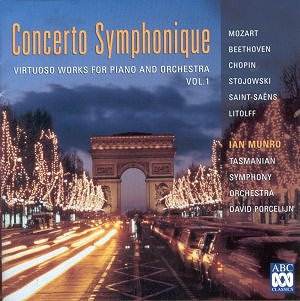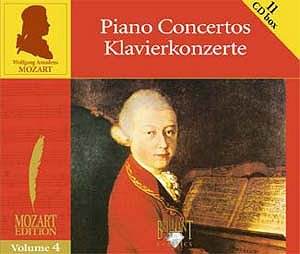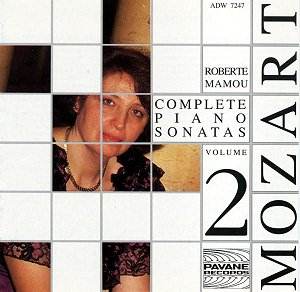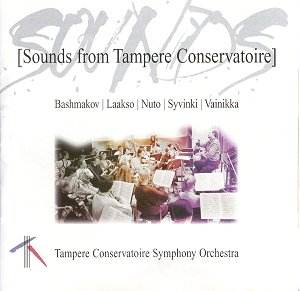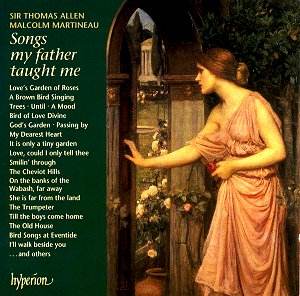 Composer: Various
Composer: Various
Works: My Father Taught Me; Passing By (E. Purcell); The Lark in the Clear Air (Trad. arr. P. Tate); My Dearest Heart, The Lost Chord (arr. Sullivan); until (S. Sanderson); Love’s Garden of Roses, It is Only a Tiny Garden, A Brown Bird Singing, Bird of Love Divine (H. Wood); Drink To Me Only (Trad. arr. Quilter); Love Could I Only Tell Thee (J. M. Capel); A Mood (A. Travers); Smiling Through (A. Penn); The Holy City (S. Adams); The Cheviot Hills (J. Robson); On the Banks of Wabash (P. Dresser); She is Far From the Land, God’s Garden (F. Lambert); In Summer Time in Bredon (G. Peel); The Trumpeter (Dix); Till the Boys Come Home (Novello); Trees (Ras Bach); The Old House (F. O’Connor); Bird Songs at Eventide (C. Coates); I’ll Walk Beside You (A. Murray)
Performers: Thomas Allen (baritone), Malcolm Martineau (piano)
Recording: HYPERION CDA 67290 [70’35”]
The British drawing room ballad, often dismissed for its melodramatic tendencies, finds an unlikely yet robust advocate in Thomas Allen’s latest recording, “My Father Taught Me.” This collection spans a period from the mid-1870s to the mid-1930s and showcases a repertoire that is equal parts nostalgic and rich with musical heritage. The featured works, while perhaps overshadowed by the grandeur of the operatic canon, are imbued with a charm and lyrical beauty that resonate deeply, especially in the hands of a consummate artist like Allen.
Malcolm Martineau’s piano accompaniment is nothing short of exemplary, providing a sensitive and nuanced foundation for Allen’s interpretations. The duo navigates the emotional landscapes of each piece with an understanding that elevates the performance beyond mere recreation. For instance, in Graham Peel’s “Trees,” Allen’s baritone flows with a warm, enveloping tone, while Martineau’s delicate touch complements the song’s pastoral imagery. The balance between voice and piano is meticulously crafted, allowing the poetry of the texts to shine through without overshadowing the melodic lines.
Allen’s interpretative choices are marked by a blend of dramatic flair and understated poignancy. In “Until” by Sanderson, a song typically rendered for soprano, Allen’s baritone imbues the text with a heartfelt yearning, crafting a narrative arc that is both relatable and deeply affecting. The phrasing is masterful; he shapes the melodic contour with acute attention to the emotional weight of the lyrics, drawing the listener into an intimate dialogue. The same can be said for his rendition of “Smiling Through,” where the interplay of lightness and depth is handled with a deftness that reveals the song’s dualities.
The recording quality is pristine, typical of Hyperion’s standards, with a clarity that allows each nuance of Allen’s voice and Martineau’s accompaniment to emerge distinctly. The engineering captures the warmth and immediacy of the performance, creating an inviting soundscape that feels both personal and expansive. The accompanying booklet is a treasure trove of information, providing insights into the historical context of the songs and illuminating connections between the composers and their works.
Comparatively, while there are numerous recordings of light music and British ballads, few can match the sincerity and artistry displayed here. Allen’s interpretation stands out not only for its technical proficiency but also for its emotional depth. It is a refreshing reminder of the genre’s capacity for genuine expression, far removed from the oversentimentalized caricature it often endures.
This recording serves as a compelling testament to the enduring appeal of the British drawing room ballad, illuminating its beauty through the artistry of Thomas Allen and Malcolm Martineau. The thoughtful selection of works, combined with exceptional performances, engages the listener on multiple levels, making “My Father Taught Me” a significant addition to the discography of British light music.
